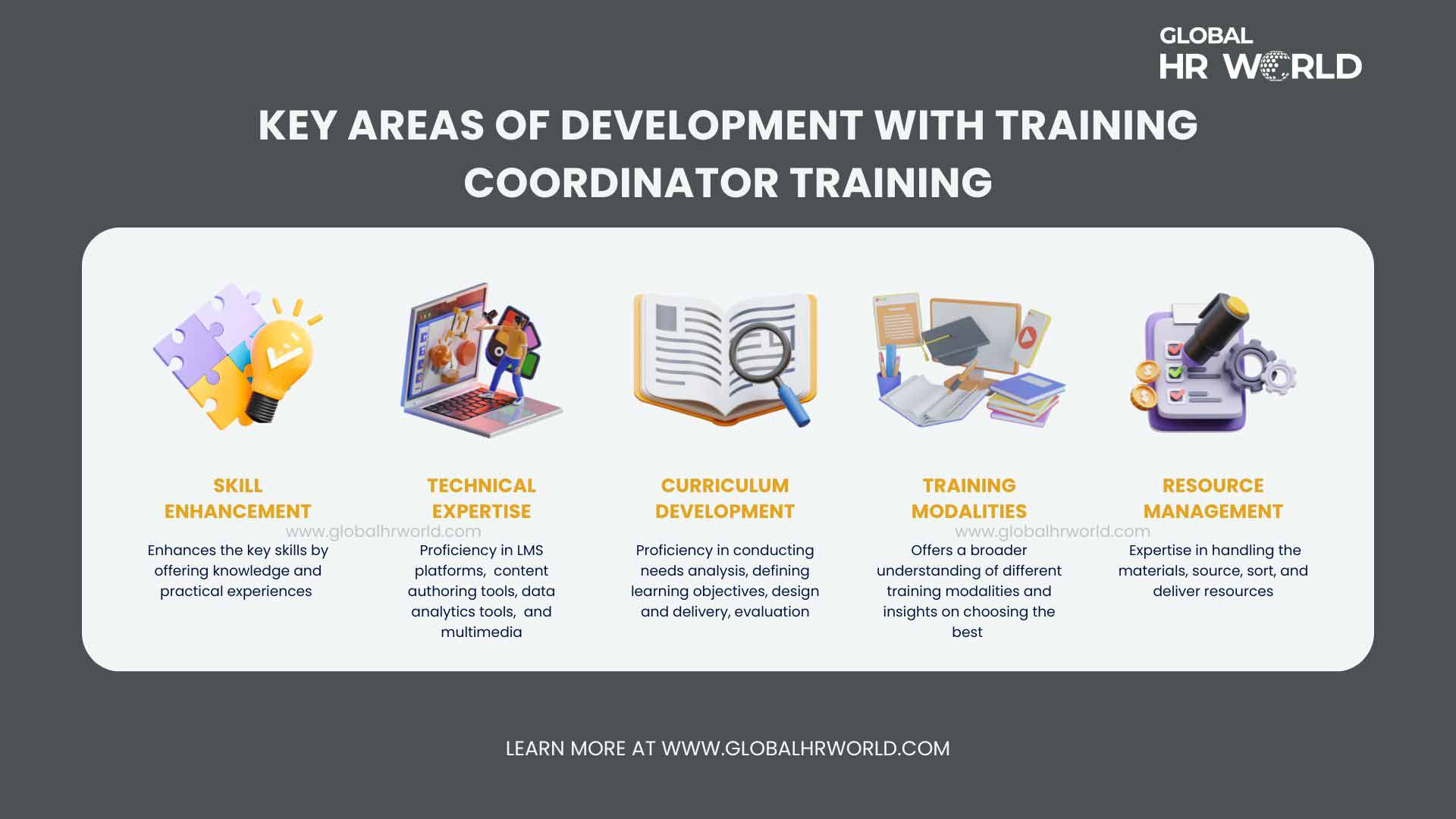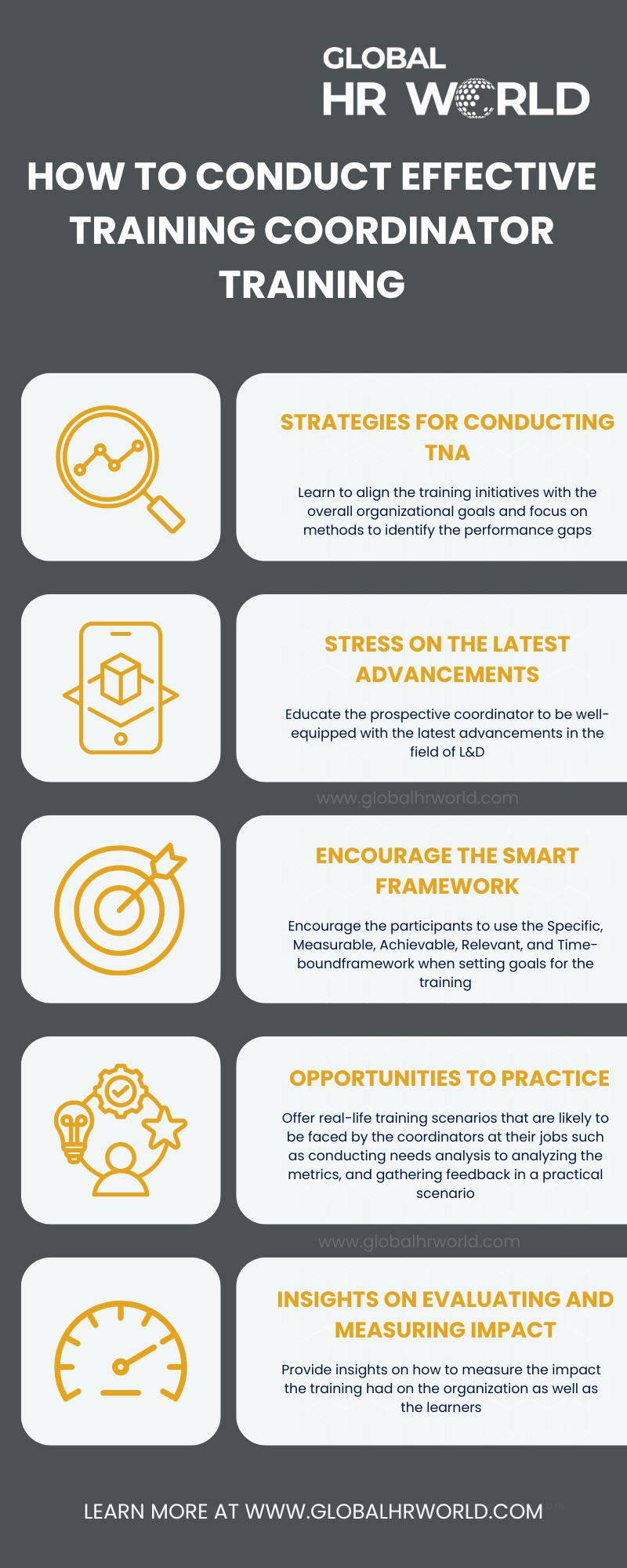Every successful and well-structured training program initiative is indebted to a key player named the training coordinator who ensures the smooth conduct of the training. Training coordinator training provides professionals with the relevant skills and knowledge to enhance the best training experiences for the participants. The following paragraphs discuss in detail the roles and responsibilities of a training coordinator, the key areas of focus of training development training, and the best practices to conduct effective training coordinator training.
Who is a Training Coordinator?
Organizations conduct regular training programs for employee development and enhanced organizational outcomes. Statistical data suggests that “company training programs yield 218% higher income per employee than those without formalized training.” (Source: Forbes). For a training program to be successfully operated, it is imperative to have a dedicated professional who can thoughtfully plan and execute it with excellence. Training Coordinator, as the name implies coordinates training programs for the organization after seeking the needs, pain points, and areas of training and discussing them with the department heads and managers. A training coordinator connects knowledge with employee development. The major roles and responsibilities of a training coordinator are:
- Assessing the training needs of the organization.
- Managing, designing, and coordinating training programs.
- Scheduling and organizing training sessions.
- Maintaining proper records of the training.
- Evaluating training effectiveness.
- Managing the budget allocated for training.
- Gathering regular feedback from the trainers and participants.
To effectively handle all these responsibilities, adopting training coordinator training is essential.
Key Areas of Development with Training Coordinator Training
Training Coordinator training plays a pivotal role in equipping training coordinators with relevant skills and knowledge to excel in the role. The training enhances the professional ability of individuals enabling them to manage, organize, and schedule training programs. Undertaking training coordinator training empowers individuals to provide smooth and impactful training experiences leading to holistic organizational success. Here are some areas of development attained as a result of training coordinator training.

Skill Enhancement
A training coordinator requires a diverse set of skills such as organizational skills to plan and organize training programs, communication skills for efficient interaction with trainers and participants, record keeping, etc. Training Coordinator Training enhances the key skills by offering knowledge and practical experiences for aspiring training coordinators.
Technical Expertise
A training coordinator should possess the necessary technical skills for the efficient conduct and results of training programs. It includes proficiency in using LMS platforms, familiarity with content authoring tools, efficiency in data analytics tools to analyze training metrics and experience with virtual platforms and multimedia. Effective training coordinator training equips the participants with in-depth knowledge of using the technology associated with training programs.
Curriculum Development
The major responsibility of training coordinators is to coordinate with department heads and subject matter experts to understand the training needs and alterations to develop training content. Training coordinator training empowers participants to be proficient in every stage of the training process including conducting needs analysis, defining learning objectives, content design and delivery, evaluation, and feedback.
Training Modalities
Every training coordinator should understand the participant needs concerning the training and should possess knowledge of the apt modality suiting the situation. Coordinator training offers a broader understanding of different training modalities such as ILT, VILT, eLearning, On-the-Job Training, Mobile Learning, etc. that cater to diverse learning styles and needs and provide insights on choosing the best suitable for the needs.
Resource Management
Training coordinator training focuses on facilitating resource management through expertise in handling the materials, effective ways to source, sort, and deliver the resources, and coordinating with the human resources involving the subject matter experts, team leads, and employees. The participants will be equipped to manage and optimize resources promoting an outstanding training environment.
How to Conduct Effective Training Coordinator Training
An effective training coordinator training builds skills in the participants to be successful training coordinators who provide all the necessary strategies to organize a training experience. To attain the maximum outcomes from training coordinator training, it is crucial to follow some best practices. They are:
Provide Strategies for Effective Training Needs Analysis
Training needs analysis “identifies gaps in knowledge or skills and the training required for employees to perform their duties to a high standard.” (Source: Indeed). An effective training coordinator trainer helps the participants to align the training initiatives with the overall organizational goals and focus on methods to identify the performance gaps. Furthermore, it equips them with the skill of properly analyzing the existing training programs and thereafter prioritizing training needs.
Stress the importance of the latest advancements
Training the training coordinator should focus on educating the prospective coordinator to be well-equipped with the latest advancements in the field of L&D. This includes personalized learning, microlearning, gamification, simulations, scenario-based training, VR/AR integrated learning, etc. The training can include practical workshops to establish familiarity with L&D tools, virtual training sessions, and integration of AI in training.
Encourage to establish the SMART framework
Encourage the participants to use the SMART framework when setting goals for the training. SMART is the acronym for Specific, Measurable, Achievable, Relevant, and Time-bound goals for successful training outcomes. Throughout the training, goal setting can be encouraged by providing real scenarios where they can adopt the goals.
Opportunities to Practice
Offer real-life training scenarios that are likely to be faced by the coordinators at their jobs. This can include all stages from collaboration with department heads, conducting needs analysis to analyzing the metrics, and gathering feedback in a practical scenario. Moreover, providing relevant case studies can educate them on the probable issues and solutions.
Insights on Evaluate and Measure Impact
When training the training coordinator, provide insights on how to measure the impact the training had on the organization as well as the learners. This includes introducing the major evaluation models such as Kirkpatrick’s Training Evaluation Model, conducting assessments and feedback using effective tools, establishing KPIs, conducting surveys, and ROI analysis to measure the impact of the training program. It is mandatory to educate the training coordinator on measuring the impact as it is the major step in developing impactful training solutions.
Conclusion
The seamless execution of every training program lies in the efficiency of the training coordinator. The training coordinator is indebted with the duties of assessing the training needs, coordinating training programs, maintaining training records, evaluating effectiveness, and training budget management. To excel in the responsibilities training coordinator training is necessary which focuses on enhancing the training coordinator’s skills such as organizational skills and communication skills, technical expertise of the latest tools, curriculum development, varied training modalities, and resource management.
Organizations can implement the best training coordinator training by educating the prospective training coordinators on adopting the strategies of conducting Training Needs Analysis, latest advancements in L&D including AR/VR integrated learning, microlearning, gamification, and simulations, establishing SMART goals for enhanced training outcomes, real-life scenarios including conducting needs analysis to analyzing the metrics and gathering feedback, and insights on evaluating and measuring impact. Effective training coordinator training reaps impactful training courses benefitting the employees and leadership. It is recommended that organizations adopt training coordinator training to establish their position in offering top-quality training solutions in the workplace.
Infographic

Knowledge Check!
Frequently Asked Questions (FAQs)
Who is a Training Coordinator?
Training Coordinator, as the name implies coordinates training programs for the organization after seeking the needs, pain points, and areas of training and discussing them with the department heads and managers. A training coordinator connects knowledge with employee development.
What are the roles and responsibilities of a training coordinator?
The major roles and responsibilities of a training coordinator are assessing the training needs of the organization, managing, designing, and coordinating training programs, scheduling and organizing training sessions, maintaining proper records of the training, evaluating training effectiveness, managing the budget allocated for training, and gathering regular feedback from the trainers and participants.
How to conduct effective training coordinator training?
Organizations can implement the best training coordinator training by educating the prospective training coordinators on adopting the strategies of conducting Training Needs Analysis, latest advancements in L&D including AR/VR integrated learning, microlearning, gamification, and simulations, establishing SMART goals for enhanced training outcomes, real-life scenarios including conducting needs analysis to analyzing the metrics and gathering feedback, and insights on evaluating and measuring impact.



